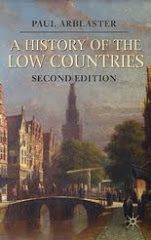
Over the past many months I've been working at translating a book about Dirck Volckertsz. Coornhert into English, to be published by Brill. Yesterday I signed off on the last revisions before the author gives her comments and a whole new raft of revisions have to be made: hopefully the last stage before sending the typescript to Brill, and waiting for the proofs ...
Coornhert is a figure I knew only vaguely as the man who got on Justus Lipsius's nerves so much that he decided to leave Holland and go back to Leuven. Having written a biography of a late-sixteenth-century Catholic controversialist who was also a humorist, moralist, translator and engraver, it's been fascinating to look at the Free Church equivalent. Coornhert was all these things - as well as being a notary public and secretary to the first assembly of the States of Holland to meet without royal warrant.
The book is about his two public disputations with Dutch Reformed clergymen, both organised under the aegis of ad hoc committees of the States of Holland. The established view is that the States organized the disputations to give Coornhert a platform to set out his views on freedom of religion, and keep the Dutch Reformed clergy from getting above themselves. The author of this book shows quite convincingly that the States organized the disputations at the insistence of the clergy, to give them a public forum in which they could once and for all reply to the public figure who had been slandering them in tabletalk and libelling them in print for years. The plan did backfire to some extent, in that Coornhert gave as good as he got, but the intention of the States was more to give the clergy an extra-ecclesial platform than to let Coornhert air his views.
Coornhert was certainly testing the limits of freedom of conscience and freedom of expression, but the States were hardly pleased with the way he was doing so. But comparing his fate to Campion's encounter with his Anglican opponents in the Tower Debates shows a lot about the differences between England and Holland in the 1570s and 1580s.


No comments:
Post a Comment